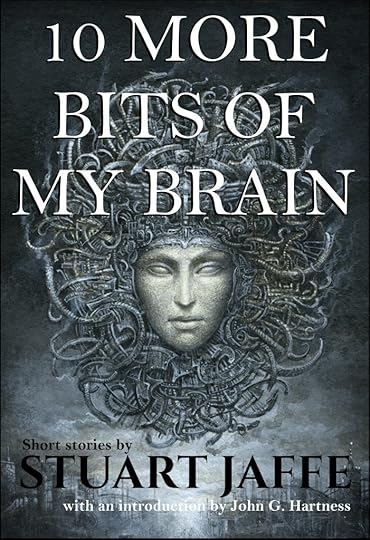Stuart Jaffe's Blog, page 3
May 9, 2014
Reading Science Fiction Makes You Smarter

Bury yourself in a book!
English teachers have long maintained that reading books makes you a better, perhaps even smarter, person. It’s likely no coincidence that their livelihoods depend on it. Now they’ve got proof, thanks to their colleagues in the science department. In fact, the increased emphasis on critical reading and writing skills in schools may partly explain why students score, on average, about 20 points higher on IQ tests than in the early 20th century.
While nobody would ever call reading a “new” method for improving the mind, recent scientific studies have confirmed that reading and intelligence have a relationship that is symbiotic in nature. Reading is good for your brain and, the smarter you are, the more likely you are to read. And, while some claim that so-called literary fiction does the best work for your brain, I’m convinced that reading Science Fiction makes you smarter, and I mean more than just predicting the future.
One Small Step For Each Reader
Here’s how it works: By forcing you to think, empathize, and assume instead of to merely accept simplistic characters whose actions and personalities that can be squarely understood, reading fiction—any fiction—literally makes you a more caring and emotionally intelligent person. In the case of Science Fiction, you exercise your brains even further to include expansive thinking, speculating, about things—emotional, philosophical, and environmental—in ways you didn’t before.
By encouraging readers to consider the possibilities rather than the limitations, of both technology and humanity, Science Fiction actually prompts readers to think more expansively. Back in the forties, SF was known as the “Fiction of Ideas” and, to this day, the genre continues to live up to its original name.
Science Fiction – Always A Step Ahead
Ultimately, no matter what humans manage to achieve, Science Fiction writers will be, by definition, always a step ahead. In some cases, Science Fiction has served as the engine driving real science to realize certain goals. Sci-Fi helps inspire young readers, who then go and make the stuff of Science Fiction become actual fact. For example, we were writing about nanotechnology well before nanotech existed. Not to mention geo-synchronous orbit, robotics, and more.
As writers, we’ve seen the landscape of science change radically during our lifetimes. “The very idea of orbiting artificial satellites and sending astronauts to the moon was science fiction when I first started my career,” said Ben Bova, author of the award-winning Titan and the upcoming Orion and King Arthur (Tor, July 3). Concepts like colonies on the moon and Mars, space elevators, and quantum computers have all been imagined by writers of Science Fiction.
One Giant Step for a Writer
Writing Science fiction gives your brain a workout, too. I’m currently working on a book that considers colonizing a new planet. The subject matter immediately presents a whole host of interesting issues for my imagination. Some of the first questions I asked myself are what happens to the human brain when confronted with the being on a planet so far from Earth that by the time you arrive, nobody from your past is still alive? What does that do to know that your history has no reference anymore? Does it free you or weigh you down?
What Books Have Made You Smarter?
As far as I’m concerned, reading fiction of any kind is just a good policy. As long as you’re reading, you’re doing yourself and those around you a favor by growing as a thinker and as a person. Do you remember any books that improved your mind for the better? David Brin’s Earth certainly opened my eyes to some near-future issues (at the time of book’s writing) involving the Internet and privacy — issues that became real in the last few years. I’d love to hear about it in the comments below.
The post Reading Science Fiction Makes You Smarter appeared first on Stuart Jaffe.
May 2, 2014
Podcast Nation: Podcasts Are Back Baby!
 Every week, my wife and I record our podcast, The Eclectic Review.The idea’s pretty straightforward: my wife, Glory, is a scientist; I’m a science fiction and fantasy writer. Each week we take 30 minutes to discuss science, art, books, movies, TV, writing, and whatever else falls in our laps. It’s called eclectic after all. Click here to check out the show!Or use the archives I’ve included at the end of this post to check out hundreds of old episodes. Literally, hundreds. Guess you could say we’re pod people.
Every week, my wife and I record our podcast, The Eclectic Review.The idea’s pretty straightforward: my wife, Glory, is a scientist; I’m a science fiction and fantasy writer. Each week we take 30 minutes to discuss science, art, books, movies, TV, writing, and whatever else falls in our laps. It’s called eclectic after all. Click here to check out the show!Or use the archives I’ve included at the end of this post to check out hundreds of old episodes. Literally, hundreds. Guess you could say we’re pod people.
We started our podcast in 2006—so, we’ve been at it for 8 years now! In podcasting terms, we’re ancient. Along the way, we’ve discussed everything from ghosts and monsters, evolution and vitamin supplements to democracy, monarchy, puppies, poultry and the War Room. Like I said, it’s eclectic. Until recently, I’d never thought of us as podcast pioneers. The Eclectic Review is just something we do each week. But, podcasts are clearly back with a vengeance, and we’re excited to be old hands.
We’ve acquired a fair number of loyal listeners without any active promotion or advertising. While I don’t have exact subscriber numbers, we do between 1500-2500 downloads a month. And, now that Apple has made its built-in Podcast app on the iPhone easier to use, I have a feeling our audience will grow. You can easily subscribe to The Eclectic Review through the iTunes store. I highly recommend that you do…plus, it’s FREE!
Podcast Predictions for the Podcast Nation
Earlier this year, www.Forbes.com’s Michael Wolfe wrote his predictions for the podcast in 2014. He points out that, with the rising tide of continued smartphone growth, podcast listenership has grown in kind. In addition, better podcast apps and the explosion in great content mean that dedicated podcast fans will only become bigger consumers of the medium. I’m hoping that they’ll influence their friends to tune is, as well. The more people into the pod, the better.
Wolf highlights the increasingly adventuresome use of the podcast format. He points to new broadcasts like Welcome to Night Vale and That American Life as examples of how the podcast medium can be used for original storytelling or satire and parody. Given the low cost to entry and the freedom of podcasting as a medium, I expect more new and creative voices to try podcasting as the year progresses.
Move Over Fellas…Welcome More Women to the Pod
While early podcast listening was male-heavy and, let’s face it, geek-heavy as well, I think one of the coolest opportunities for the future is more female involvement. And not just as listeners, more women are recording their own podcasts, too. That means more cool content from more fresh perspectives. Wolf sees this as a direct result of the continued expansion of podcast content beyond tech and comedy (though there are plenty of women listeners there already) and ever-greater accessibility of podcast content as it moves into connected cars and elsewhere. I say welcome to the pod!
This American Podcast
Many of you may be familiar with the radio show This American Life. Perhaps you listen to it on your local public radio station. You may not have realized it, but you’ve been listening to a podcast all along. This American Life is the most popular podcast in the country, with around one million people downloading each episode.
The weekly public radio show is broadcast on more than 500 stations to about 2.1 million listeners. Produced by Chicago Public Media and distributed by Public Radio International, the show has won all kinds of major broadcasting awards. When you subscribe to the free weekly podcast, episodes automatically download to your computer. Episodes are available for exactly one week, beginning the Monday after broadcast. Podcast content is the same as the radio broadcast. To subscribe to This American Life using iTunes, click here.
The Eclectic Review Archives
Are you a regular podcast listener? What are some of your favorites? I’d love for you to share them with me as I’m always looking for new things to listen to. If you’re not on board with the pod yet, check out our archives below for a listen. Better yet, we’d be thrilled if you subscribed to The Eclectic Review for free and tuned in with us each week to become a part of the podcast nation.
THE ECLECTIC REVIEW
The Eclectic Review (51 – 100)
The Eclectic Review (101 – 150)
The Eclectic Review (151 – 200)
The Eclectic Review (201 – 250)
The Eclectic Review (251 – 300)
The Eclectic Review (301 – 350)
The Eclectic Review (351 – 400)
The post Podcast Nation: Podcasts Are Back Baby! appeared first on Stuart Jaffe.
April 25, 2014
Are Our Heroes Getting Smaller?
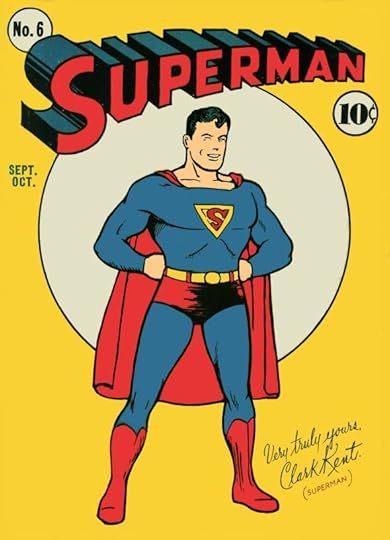 Faster than a speeding bullet. More powerful than a locomotive. Able to leap tall buildings in a single bound…It’s Superman! When two Cleveland high school students, Jerry Siegel and Joe Schuster, created the larger-than-life superhero in 1933, they established the prototype for the superhero genre. Many consider Superman the greatest comic book hero of all time and his character has become the blueprint for all who followed. From his signature red cape and red and yellow “S” shield emblazoned on his chest to his fight for social justice and against tyranny, Superman represents the ultimate mythic hero.
Faster than a speeding bullet. More powerful than a locomotive. Able to leap tall buildings in a single bound…It’s Superman! When two Cleveland high school students, Jerry Siegel and Joe Schuster, created the larger-than-life superhero in 1933, they established the prototype for the superhero genre. Many consider Superman the greatest comic book hero of all time and his character has become the blueprint for all who followed. From his signature red cape and red and yellow “S” shield emblazoned on his chest to his fight for social justice and against tyranny, Superman represents the ultimate mythic hero.
Would Superman Fly Today?
It’s hard to imagine two contemporary teenagers from the Midwest concocting a superhero defined primarily by his sound moral fiber. The Superman of lore routinely dons his cape in an effort to right the wrongs not only of individuals but also of society at large. What’s more, when not in his heroic persona, Clark Kent is a mild-mannered journalist working for The Daily Planet in the fictional American city of Metropolis. His alter ego a mystery, Kent seeks no acclaim, fame, or even gratitude for his selfless acts of heroism. Admirable? Indeed. Improbable by today’s standards? Without a doubt.
The More Awesome the Cause, the More Awesome the Conference
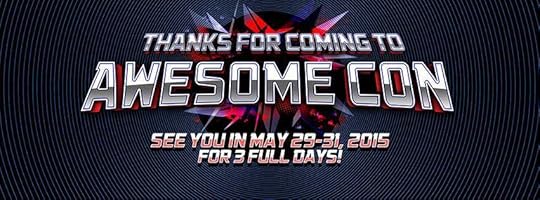 Last weekend, I traveled to Washington, D.C. for AwesomeCon—a celebration of all things popular culture. At its heart, AwesomeCon is a comic-con that embraces all aspects of Geekdom and pop culture, with a wide assortment of comic books, collectibles, toys, games, original art, cosplay, and so much more. I was one of about 40,000 or so in attendance and can’t wait to go back next year. Special events included discussion panels (I served on three of them), costume contests, trivia contests, gaming tournaments, and tons of activities for kids and for the kid in you. If you’re a fan of any of the above and have never attended, I strongly recommend that you mark your calendar today and begin planning accordingly. Learn all about the awesomeness here http://awesomecondc.com.
Last weekend, I traveled to Washington, D.C. for AwesomeCon—a celebration of all things popular culture. At its heart, AwesomeCon is a comic-con that embraces all aspects of Geekdom and pop culture, with a wide assortment of comic books, collectibles, toys, games, original art, cosplay, and so much more. I was one of about 40,000 or so in attendance and can’t wait to go back next year. Special events included discussion panels (I served on three of them), costume contests, trivia contests, gaming tournaments, and tons of activities for kids and for the kid in you. If you’re a fan of any of the above and have never attended, I strongly recommend that you mark your calendar today and begin planning accordingly. Learn all about the awesomeness here http://awesomecondc.com.
Are Our Heroes Getting Smaller? And How!
One of the panels that I participated in, along with my good friend and author-extraordinaire Gail Z. Martin, posited the provocative question: Are Our Heroes Getting Smaller? It turned out to be among the most well attended discussions of the day and we were all pleased to see that it was standing room only (even with the air conditioning creating sub-arctic temperatures). The topic was rich and the debate was lively.
Between the audience and my fellow panelists, we shared our diverse opinions about the unique nature of the contemporary superhero and discussed the cultural attitudes and zeitgeist (yes, I said zeitgeist) that likely contribute to the latest incarnation of the superhero. Here is a sampling of explanations for the case of the ever-shrinking hero.
The times we live in – The fiction that we create is always a product of the time in which we live. It’s not by chance that fiction is experiencing a post-apocalyptic moment. Times are tough. Our economy is flagging. War is a constant somewhere across the globe. And, the modern citizen – like the modern hero – doesn’t know whom to trust. At first blush, a seemingly average character like Katniss from The Hunger Games, or Malja from The Malja Chronicles, find themselves propelled by their circumstance into a natural born warrior or kickass killer for the common good.
Our leaders are tragically flawed – In our real world, we are hard-pressed to find role models without a few skeletons in their closets. Politicians, sports heroes, and celebrities who once occupied a glamorized station in American culture can no longer keep their private lives, well, private. What’s more, we have developed an insatiable appetite for other people’s secrets. Case in point: O.J. Simpson…Over the course of his lifetime, he’s gone from national superhero, “The Juice,” to that guy who got away with a double-murderer and big time loser par excellence. While we are disappointed in the shortcomings of our real-life exemplars, the more flaws our fictional characters embody, the more fun they are to read about — especially when the triumph over those flaws.
Advances in technology and mass communication – Contemporary technology, the modern military complex, the Internet, and surveillance capabilities are relatively easily accessible to those with the know-how and malevolent intent. Humans have developed catastrophic warfare machinery making it possible to wipe out the entire world by simply pressing one not necessarily secure button. Only a tiny, and very geeky, twenty-first century cyber-hero could crack the code.
Superman doesn’t stand a chance. His cape would get caught in some security gate en route to the inner sanctum. Not to mention, phone booths are practically extinct. Sorry Clark Kent…you’re never going to get the scoop again. Not in this century.
Who do you call when you need a hero?
Leave a comment below…Or, maybe give the Bat-phone a call and see if you get an answering machine.
The post Are Our Heroes Getting Smaller? appeared first on Stuart Jaffe.
April 17, 2014
7 Reasons Paranormal Fiction Keeps the Pages Turning
If you’re not reading something paranormal right now, well, you’re just not normal! Paranormal fiction, and its many subgenres, is seeing record sales and its popularity shows no signs of waning any time soon…not in this publishing universe anyway.
What Makes Paranormal Fiction Paranormal?
If you look up paranormal fiction, the geeks over at http://www.wisegeek.com will describe the genre something like this:
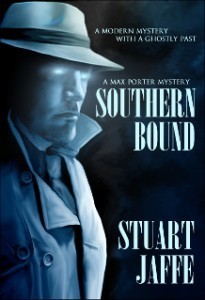 Paranormal fiction, sometimes called supernatural fiction, falls under the broader umbrella of Fantasy fiction. Paranormal stories generally contain supernatural elements like ghosts, vampires, werewolves, shape-shifters, and other sorts of magical or otherworldly creatures. Generally, paranormal fiction goes beyond scientific facts and logical explanations to speculate about things that can’t be seen or proved, such as extrasensory perception (ESP), alien life, or time travel.
Paranormal fiction, sometimes called supernatural fiction, falls under the broader umbrella of Fantasy fiction. Paranormal stories generally contain supernatural elements like ghosts, vampires, werewolves, shape-shifters, and other sorts of magical or otherworldly creatures. Generally, paranormal fiction goes beyond scientific facts and logical explanations to speculate about things that can’t be seen or proved, such as extrasensory perception (ESP), alien life, or time travel.
What’s more paranormal fiction (PF) can span across genres—from young adult (YA) fantasy, urban fantasy, supernatural horror, and paranormal romance. Some books in the mystery genre also have paranormal elements, such as a psychic detective or a villain who uses magic or special powers to do his evil work. I’ll talk more about my Max Porter Paranormal Mysteries in a bit.
But, first, let’s see what all the fuss is about.
7 Reasons You Should Be Reading Paranormal Fiction
It takes you away – Readers get to travel from their earthly plane to unknown and unimagined worlds. Paranormal Fantasy writers build worlds from the ground up and take you with them on a trip to a foreign frontier. You may find yourself transported from the here-and-now to the land of the Fae, to the Ottoman Empire, or, as in my Max Porter Paranormal Mysteries, to a North Carolina brewing underneath the one you may know. Oh, the places you’ll go!
You’ll meet fascinating characters – Readers get to meet exotic or mystical creatures far from their everyday lives. Many Anglo-Saxon cultural myths and archetypes serve as fodder for writers of the paranormal—oddballs like vampires, werewolves, and ghosts are staples. Not the sort you’re likely to come in contact with during your ‘normal’ day-to-day affairs. Hey, that’s what makes these characters paranormal, right?
The impossible is possible – We’re all used to traditional storytelling conventions. Characters grapple with the relationships, conflicts, and tension of their lives—usually in a linear fashion. The story arc rises to a climax and eventually resolves itself in a conclusion. With paranormal fiction, writers have the freedom to experiment with new constructs of time, space, and even logic resulting in endless unpredictable plotlines and narrative possibilities. Once the characters in PF get too comfortable, chances are, their world is about to be upended. That’s what makes the paranormal so much fun!
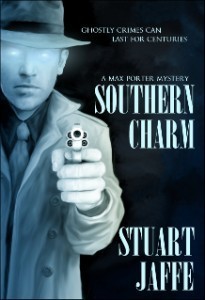 Because the suspense is killing you – Most paranormal fiction, whatever the genre, is released in series or serial form. For those of you who read my blog, you know I’m not a fan of the cliffhanger. I find it to be a cheap ploy; however, I do recognize the power of crafting memorable characters and storylines that keep readers coming back for more…and more. I’m very thankful for my readers who do just that.
Because the suspense is killing you – Most paranormal fiction, whatever the genre, is released in series or serial form. For those of you who read my blog, you know I’m not a fan of the cliffhanger. I find it to be a cheap ploy; however, I do recognize the power of crafting memorable characters and storylines that keep readers coming back for more…and more. I’m very thankful for my readers who do just that.
To make sense of taboo – While sexuality is not a huge taboo in the West, in many parts of the world expressing one’s gender or sexual orientation can still be dangerous, forbidden, or considered abnormal. For that reason, there will always be a need for paranormal tales to reconcile cultural taboos. For example, the Vampire Lestat in Anne Rice’s Interview with a Vampire put a premium on drinking young blood—this can be read as an allegory of innocence lost. As the nocturnal vampire archetype reveals, only bad things happen after dark.
Sometimes you just need a hero – Heroes in paranormal fiction are often just regular people who find themselves swept up in highly irregular circumstances. It could be someone just like you. We’ve all got an inner superpower…paranormal stories help you channel yours.
To see what all the fuss is about – Many of the above reasons hold true for all sorts of Fantasy fiction which is why Fantasy has become the #2 selling genre just behind Romance (which has been #1 since records have been kept on genre sales). Clearly, a lot of people are interested.
Reasons to Read The Max Porter Paranormal-Mysteries
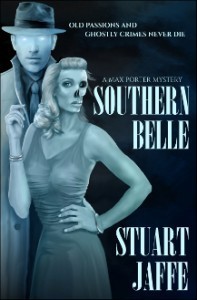 The first of my Max Porter paranormal-mysteries, Southern Bound, encompasses much of what I just talked about. For starters, Max is just a regular guy with financial problems who takes a job that changes his world forever. The ghost of a 1940s detective haunts his Winston-Salem, North Carolina office. And the story was inspired by my own research on some real—and highly unusual—history from the region.
The first of my Max Porter paranormal-mysteries, Southern Bound, encompasses much of what I just talked about. For starters, Max is just a regular guy with financial problems who takes a job that changes his world forever. The ghost of a 1940s detective haunts his Winston-Salem, North Carolina office. And the story was inspired by my own research on some real—and highly unusual—history from the region.
Over the course of the series, Max finds himself thrust neck-deep in a world of old mysteries and dangerous enemies. One in which ghosts, witches, curses, and spells exist. In Southern Charm, Max (and his paranormal crew) is hired by an art-forging ghost to find a lost painting. And villains old and new come out, and the race is on for the painting and the secrets it contains. The third book in the series, Southern Belle, brings our team face to face with a cursed witch coven and the FBI.
If you’re reading this you’re probably a fan of paranormal fiction. How do you explain its immense popularity? What’s in it for you?
Leave me a comment and let’s figure this out together!
The post 7 Reasons Paranormal Fiction Keeps the Pages Turning appeared first on Stuart Jaffe.
April 10, 2014
Can first lines of books really be all that?
Recently, I was talking with a good friend about first lines of books. Some lines are famous, some are powerful, but I find that most lines (first or otherwise) don’t stand on their own all that well. They need the context of the entire work or at least the surrounding paragraphs to make them resonant.
All good writers pay close attention to that first line, that first paragraph, and that first page. If you fail the readers at the beginning, it doesn’t matter how cool your ending is, they’ll never get that far. So, from a technical standpoint, I understand and can appreciate the power behind certain opening lines. But I suspect that the real reason some lines become famous has little to do with the lines themselves and more to do with the works as a whole.
Some examples:
 Call me Ishmael. — Yup. Definitely a famous first line. In fact, I’ve seen this opening line used to help other writers learn how to write an opening line. But, come on. Take a close look at that line. It’s got some cool things going for it — it immediately draws in the reader by speaking directly to her, it opens with a character, and it packs a punch by being so short. All worthwhile things to accomplish as a writer. But that’s technical. The reason this line resonates with readers has to do with the rest of Moby Dick for which this line has become a symbol. That’s why Call me, Fred doesn’t do much for us.
Call me Ishmael. — Yup. Definitely a famous first line. In fact, I’ve seen this opening line used to help other writers learn how to write an opening line. But, come on. Take a close look at that line. It’s got some cool things going for it — it immediately draws in the reader by speaking directly to her, it opens with a character, and it packs a punch by being so short. All worthwhile things to accomplish as a writer. But that’s technical. The reason this line resonates with readers has to do with the rest of Moby Dick for which this line has become a symbol. That’s why Call me, Fred doesn’t do much for us.
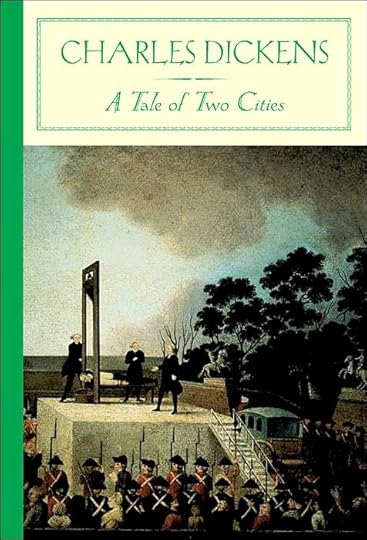 It was the best of times, it was the worst of times. — Another classic. Here we have a line that’s a bit poetic and has an interesting rhythm, but what really makes this a winning opening line is the rest of the paragraph. The continuation of the pattern of opposites. And what makes that paragraph work is the fact that the title of the novel is A Tale of Two Cities. Without that title, the whole opening paragraph might have been written off as lunacy, but because of the context which the title implies, the reader immediately starts to connect dots — two viewpoints (best/worst of times), two cities, hmmmm.
It was the best of times, it was the worst of times. — Another classic. Here we have a line that’s a bit poetic and has an interesting rhythm, but what really makes this a winning opening line is the rest of the paragraph. The continuation of the pattern of opposites. And what makes that paragraph work is the fact that the title of the novel is A Tale of Two Cities. Without that title, the whole opening paragraph might have been written off as lunacy, but because of the context which the title implies, the reader immediately starts to connect dots — two viewpoints (best/worst of times), two cities, hmmmm.
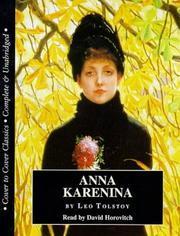 All happy families are alike; each unhappy family is unhappy in its own way. – One of the most famous opening lines ever written. This one actually holds up on its own for a bit. Yet it gains far more weight when we realize the line is setting up an epic Russian tragedy. It’s a thought-provoking line, yet it resonates because of what promises to be the unhappy life of an unhappy woman. In fact, had Anna Karenina not been one of Tolstoy’s greatest works, the line — though profound — might have been forgotten long ago.
All happy families are alike; each unhappy family is unhappy in its own way. – One of the most famous opening lines ever written. This one actually holds up on its own for a bit. Yet it gains far more weight when we realize the line is setting up an epic Russian tragedy. It’s a thought-provoking line, yet it resonates because of what promises to be the unhappy life of an unhappy woman. In fact, had Anna Karenina not been one of Tolstoy’s greatest works, the line — though profound — might have been forgotten long ago.
These are all from classics, but the same holds true for any novel. It’s context that gives a sentence its weight. We’re drawn to remember opening lines because they’re first, but really any line in a novel is propped up by context. That’s why Hemingway could write the most basic, simplistic combinations of words and make them feel heavier than the iceberg of meaning he has underneath.
What are some of your favorite opening lines? Do you think they hold up on their own?
The post Can first lines of books really be all that? appeared first on Stuart Jaffe.
April 4, 2014
Think Like A Man: Can Women Write Male Characters?
A few years ago, a friend of mine – a New York Times Bestseller – asked my opinion about a story she was working on. She was concerned, as a woman, about the believability of her main male character. Though flattered that she trusted my expertise in these matters, I hadn’t really thought much about it before. Then, this week, I read a couple of posts written by male authors addressing this same concern.
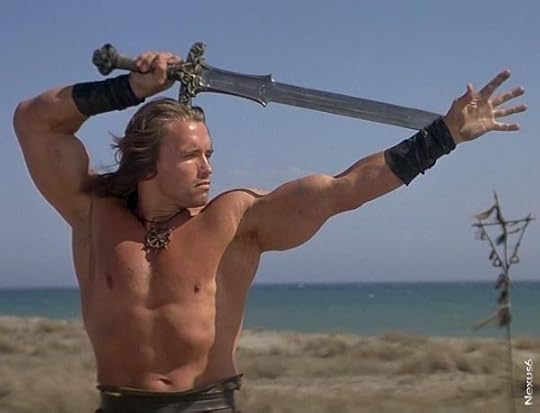
Let’s face it. This …
They asked the question: can a female author craft a convincing male character? It’s become commonplace to ask the question in reverse. For some time, there’s been a sort of prevailing wisdom that guys just don’t get girls. The mysteries of the female psyche, the argument goes, are beyond the grasp of male comprehension. And male authors have been routinely skewered for writing female characters that are one-dimensional, stereotypical, vapid, or hyper-sexualized. Particularly in the Science Fiction and Fantasy genres. To some extent, this is left over from the early days of SF/F when the genre was dominated by scientific minds like Asimov and Heinlein. And let’s face it – the mentality of men towards women in the 1940s and 1950s was not that evolved. So, yeah, back then, there was some merit to the argument. But his is the 21st century. Times have changed, and so have most of us.
We’re All Human
Now, I’m inclined to believe that men and women have more in common than not. Once you get past the obvious physical differences, it’s clear we’re both human, after all. In my experience, the psychological and emotional differences between genders are rather subtle with most of us falling somewhere in the middle of the spectrum. Most men are more than boiling fury and stoic responses. Most women are more than sweet empathy and shared tears. In fact, each of us contain plenty of the other side.
Besides, when a writer does his or her job right, nobody stops reading long enough to take notice of whether a man or woman is doing the writing. Ideally, you could take the author’s name off of a book and let the characters stand on their own merit. Now, I don’t recommend that you do that to my books, but you get my point.
A Question of Character

…is really no better than this.
As far as I’m concerned, the success of a good plot revolves around the quality of the characters. And further, the character’s gender is simply one of a constellation of factors that go into the creation of any three-dimensional figure—male or female. Still, there are plenty of naysayers out there who believe that a man attempts to create a convincing female character at his own peril.
I’ve been writing strong female characters for some time. Malja, the heroine of my post-apocalyptic Malja Chronicles is an ass-kicking warrior who still has a feminine side. I’ve been conscious not to draw her simply as “Conan in a skirt.” To that end, Malja has a protective maternal side as well, earning her both male and female fans. From what my readers tell me, I’ve done a pretty convincing job of it.
I created an even bigger challenge for myself in my YA Urban Fantasy series starring teenage heroine Gillian Boone. While grown women and men are more alike than different, teen-aged girls were completely baffling to me until I started writing Gillian. Teen boys I get – I was one once. 95% of the time, it’s all from the groin. Sex and its possibility are the primary motivating factor. That and food. For girls, after interviewing my wife and some gracious college girls willing to admit how they thought a handful of years earlier, I now know, it’s much more (dare-I-say) complex.
Give the People What They Want
Most writers, at least to some degree, respond to the needs of their audience. Their chosen genre tends to dictate the types of characters that they create. But, I don’t think that the genre has to have a limiting or negative effect. Whether you’re writing a Romance set in the medieval era or a Science Fiction novel set in the distant future, the characters can still be rendered convincingly and completely—of either gender.
Do you have a favorite character written by an author of the opposite genre? Or do you think it can’t be done? Leave your comments and let’s talk about it.
The post Think Like A Man: Can Women Write Male Characters? appeared first on Stuart Jaffe.
March 27, 2014
Parenting Through the Page
As a writer, reading has always been a significant part of my life. My parents divorced when I was little, so my Dad wasn’t around to tell me bedtime stories. I don’t recall my mother reading to me either (though I’m sure she did), but I do recall reading when I was very young. I couldn’t put down the 1964 children’s novel Harriet the Spy, both written and illustrated by Louise Fitzhugh. It has been called “a milestone in children’s literature” and a “classic”—accolades that are well deserved.
Robert Arthur, Jr’s American juvenile detective book series first published as Alfred Hitchcock and the Three Investigators kept my mind—and hands—occupied as well. Arthur believed using a famous figure such as thriller movie director Hitchcock would attract attention and it definitely got mine. The mysteries typically involved investigation of baffling phenomena—like an ancient Egyptian mummy that appeared to whisper and a human skull that purported to speak). When I was ten-years-old, I voraciously consumed King Kong which I loved. And—because my big brother read them—I had many a sleepless night after reading some of Edgar Allan Poe’s work (the stuff I could understand, anyway).
All of the books I read as a child, it turns out, have influenced my work as a writer of Young Adult, Urban Fantasy, Science Fiction, Paranormal Mystery, and Post-Apocalyptic Fiction. I don’t know why I gravitated to genre works – maybe it’s in my blood somehow – but whatever the reason, those were the stories that gained my interest. Those led to Heinlein, Asimov, King and more as I grew older.
Reading it Forward – Like Father, Like Son
While I don’t remember my parents reading with me, my wife and I wanted to make sure that our son, Gabe, grew up in a book-filled world. When he was growing up, we read constantly to him. We started with old myths and fairy tales. And, as he got older, moved on to the Chronicles of Narnia, King Arthur Tales, each and every Harry Potter, and Redwall, to name a few. Today, Gabe is sixteen and steeped heavily in Manga. But whereas I read Marvel comics at sixteen and dug the action of Spidey and the X-Men, my son dissects the storylines and discusses the character development in these tales.
YA & Urban Fantasy Fiction – A Parenting Tool That Knows No Bounds
Now, my wife and I consider us lucky to have a kid like Gabe. Through our reading, talking about books, media and life, we’ve grown closer as a family. We’ve discovered that being geek parents raising our kid in a geek culture has presented us with some rare opportunities to connect. My YA Fantasy and Science Fiction writing has helped open up a discourse with our child to discuss any number of issues facing kids today.
The Young Adult Urban Fantasy genre enables me, as a writer, to explore just about every topic—and with no limits. Issues of race, gender, sexuality, power, even bullying and friendship. In addition, I’ve found that genre fiction allows us, as parents, to use the characters and storyline to candidly discuss the range of complex issues facing kids today as we reinforce our personal values.
How have books brought you and your family closer together? Do you have any book recommendations that your family has enjoyed?
Please share your thoughts on parenting through the page with me. I’d love to hear them…In the meantime, if you want to know what we think is so wonderful about Gabe, check out his YouTube Channel—he even caught me in a game of #DadTag (below)—I’m both proud and flattered.
The post Parenting Through the Page appeared first on Stuart Jaffe.
March 25, 2014
New Release — 10 More Bits of My Brain!
It’s here! The official new release of 10 More Bits of My Brain features ten short stories, some previously published, some brand-spankin’ new, for your enjoyment! Plus an introduction from the wonderful John G. Hartness (author of The Black Knight Chronicles and the Bubba the Monster Hunter series).
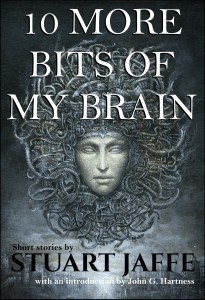
Here’s the blurb:
Stuart Jaffe returns with ten more stories from his unique and boundless imagination.
Apocalyptic madness, pirates, blues music, murder, and steampunk are just a little of the wonders you’ll uncover in these pages.
Strange and beautiful, action-packed and deadly, lovely and romantic, Stuart covers it all and more in what promises to be a fun-filled journey you won’t soon forget!
Here’s the story list:
Man in the Woods
The Spirits of Magic
Getting Home
Mrs. Donovan
Tarwell’s Last Day as a Pirate
The Bluesman #1: Killer of Monsters
It’s The Little Things
Perchance
In Shadow
Little Girl with Pink Ribbons
And here are the links:
Amazon (both print and kindle): Click Here!
Barnes & Noble (both print and nook): Click Here!
The post New Release — 10 More Bits of My Brain! appeared first on Stuart Jaffe.
March 21, 2014
Blinded By Science: An In-No-Way Comprehensive Guide to Science Fiction and Fantasy TV
Grab your clicker folks and cue up the DVR. 2014 might be the year of Science Fiction and Fantasy TV. It’s only March, and the shows keep serving up some serious viewing pleasure for fans of SF/F—no trips to your local theater or video shop required (not that anybody goes to a video shop anymore, but you get the point). The major networks have even gotten on board so you don’t even need basic cable to get your fix of werewolves, vampires, hauntings, time travel, superheroes and the supernatural. Or, if you’re like me and got rid of cable in favor of Netflix, Hulu, and the internet, you can get your fix on your own schedule. Now, I don’t have as much time as I would like to watch most of this cool new programming. I wish I did but my books aren’t going to write themselves.
This guide in no way represents an endorsement or a comprehensive list of the greatest or most recent Science Fiction and Fantasy TV offerings, but more of a wish list.
5 Shows I Wish I could Binge-Watch This Year
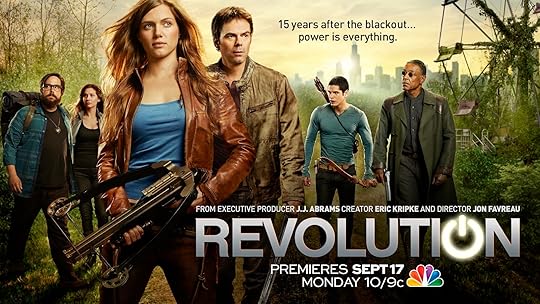 1. Revolution – This “swashbuckling drama” is back for the second season. From J.J. Abrams’ Bad Robot Productions and “Supernatural” creator Eric Kripke, the show centers on the Matheson family. After a mysterious worldwide blackout, the Mathesons struggle to survive in a post-apocalyptic world for 15 years. Though epic in scope, the focus on family life tells an intimate story. The family’s grim world after the crash is juxtaposed with bucolic images of overgrown cities and a vision of hope, rebirth and retribution. Season 1 was fantastic and came with the bonus of having one of my son’s childhood friends in an episode!
1. Revolution – This “swashbuckling drama” is back for the second season. From J.J. Abrams’ Bad Robot Productions and “Supernatural” creator Eric Kripke, the show centers on the Matheson family. After a mysterious worldwide blackout, the Mathesons struggle to survive in a post-apocalyptic world for 15 years. Though epic in scope, the focus on family life tells an intimate story. The family’s grim world after the crash is juxtaposed with bucolic images of overgrown cities and a vision of hope, rebirth and retribution. Season 1 was fantastic and came with the bonus of having one of my son’s childhood friends in an episode!
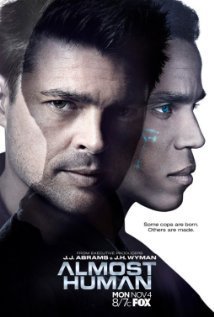
2. Almost Human – This Science Fiction/Crime drama, also created by Bad Robot Productions along with Warner Bros, set in the not-so-distant future serves up gritty, realistic Sci-Fi action. Human cops and androids partner up to protect and serve, licking up blood and kicking crime’s ass. Yes, it’s set in the future, but rather than a dystopia the show takes place in a civilization where technological development has outpaced ethical considerations.
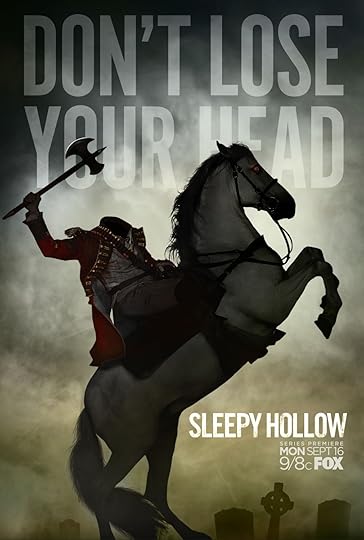
3. Sleepy Hollow – An update of Washington Irving’s classic tale, this Supernatural/Crime show follows the story of Ichabod Crane. After he wakes up in the 21st century, Crane finds his 18th-century nemesis, the Headless Horseman, has also come along for the ride. Their fantastic journey through time brings them to modern-day crime fighters who attempt to unravel a mystery that dates all the way back to the founding fathers.
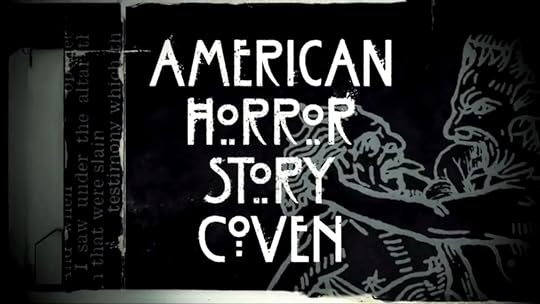 4. American Horror Story: Coven – Coven tells the secret history of witches and witchcraft in America. Over three hundred years have passed since Salem and those who managed to escape are now facing extinction. Mysterious attacks against their kind are escalating and young girls are being sent away to a special school in New Orleans to learn how to protect themselves. Now, I know this program has been going for a few years, but, since this witchy season is supposed to feature a Stevie Nicks cameo, I had to put it on my wish list. Couple that with the amazing Jessica Lange, and this show is seriously binge-worthy.
4. American Horror Story: Coven – Coven tells the secret history of witches and witchcraft in America. Over three hundred years have passed since Salem and those who managed to escape are now facing extinction. Mysterious attacks against their kind are escalating and young girls are being sent away to a special school in New Orleans to learn how to protect themselves. Now, I know this program has been going for a few years, but, since this witchy season is supposed to feature a Stevie Nicks cameo, I had to put it on my wish list. Couple that with the amazing Jessica Lange, and this show is seriously binge-worthy.
 5. Cosmos: A Space Time Odyssey – The follow up to Carl Sagan’s Cosmos: A Personal Voyage, this new journey into space, time and the unknown will be hosted by the charismatic physicist Neil DeGrasse Tyson. Obviously this is science with a capital “S” and there’s nothing fictional about it. But, the reincarnation of Sagan’s classic show about the workings of the universe is so exciting that I just may take some time off from my writing and tune in.
5. Cosmos: A Space Time Odyssey – The follow up to Carl Sagan’s Cosmos: A Personal Voyage, this new journey into space, time and the unknown will be hosted by the charismatic physicist Neil DeGrasse Tyson. Obviously this is science with a capital “S” and there’s nothing fictional about it. But, the reincarnation of Sagan’s classic show about the workings of the universe is so exciting that I just may take some time off from my writing and tune in.
What are your favorite Science Fiction and Fantasy TV shows?
I’d love to hear your thoughts and recommendations. Do you think any of these programs are binge-worthy?
The post Blinded By Science: An In-No-Way Comprehensive Guide to Science Fiction and Fantasy TV appeared first on Stuart Jaffe.
March 18, 2014
Cover Reveal – 10 More Bits of My Brain
It’s cover reveal time! So, this has been one of my special, secret projects in the works for a while. I had to wait for the rights to revert back to me on several stories, and I had to get one of my author friends to write an introduction, and yada yada yada….Point is: my second collection of short stories is coming out very soon! This collection features 6 previously published stories and 4 that are All New! And without further ado…here’s the cover (yes, same artist as the first collection’s cover):
The post Cover Reveal – 10 More Bits of My Brain appeared first on Stuart Jaffe.

